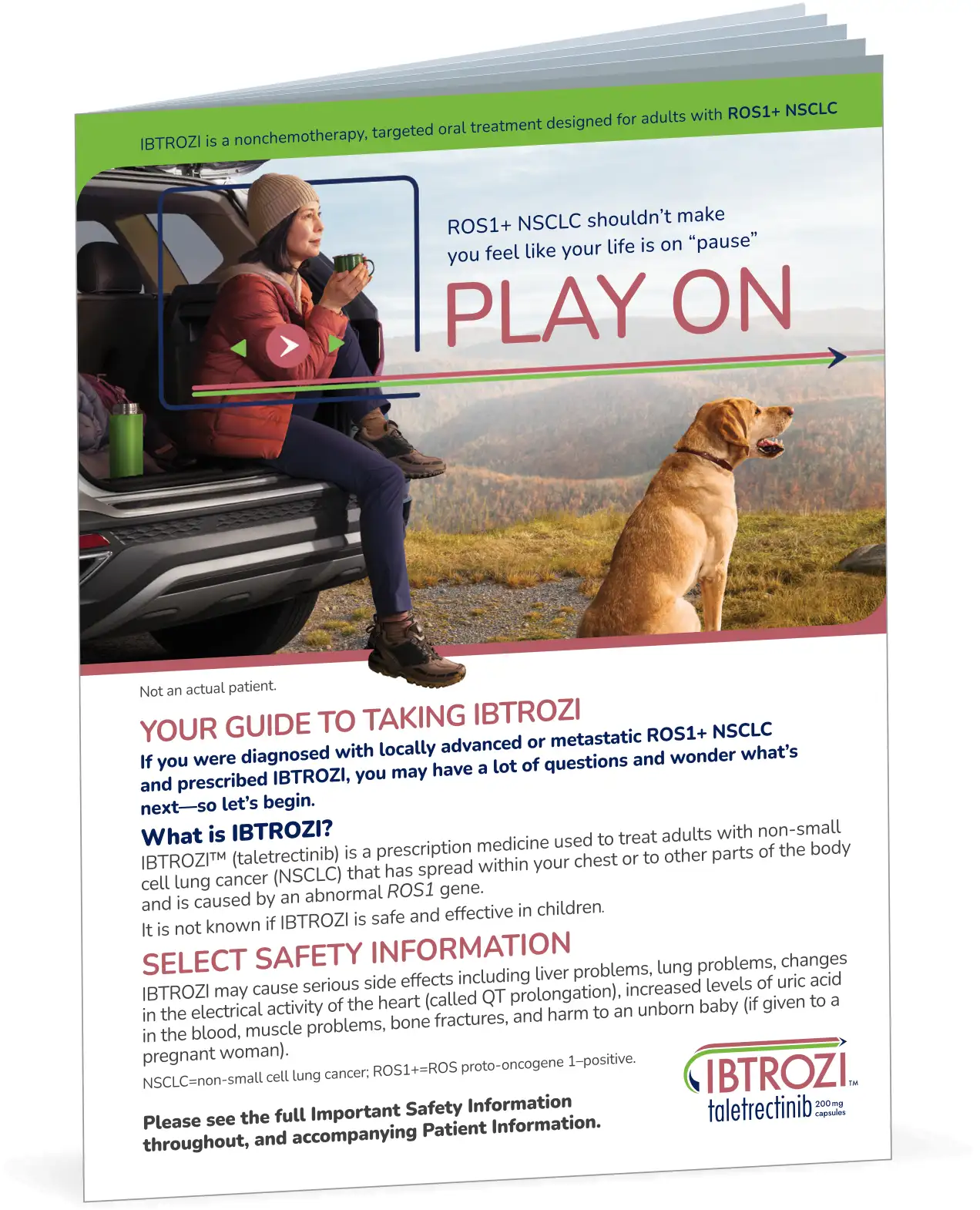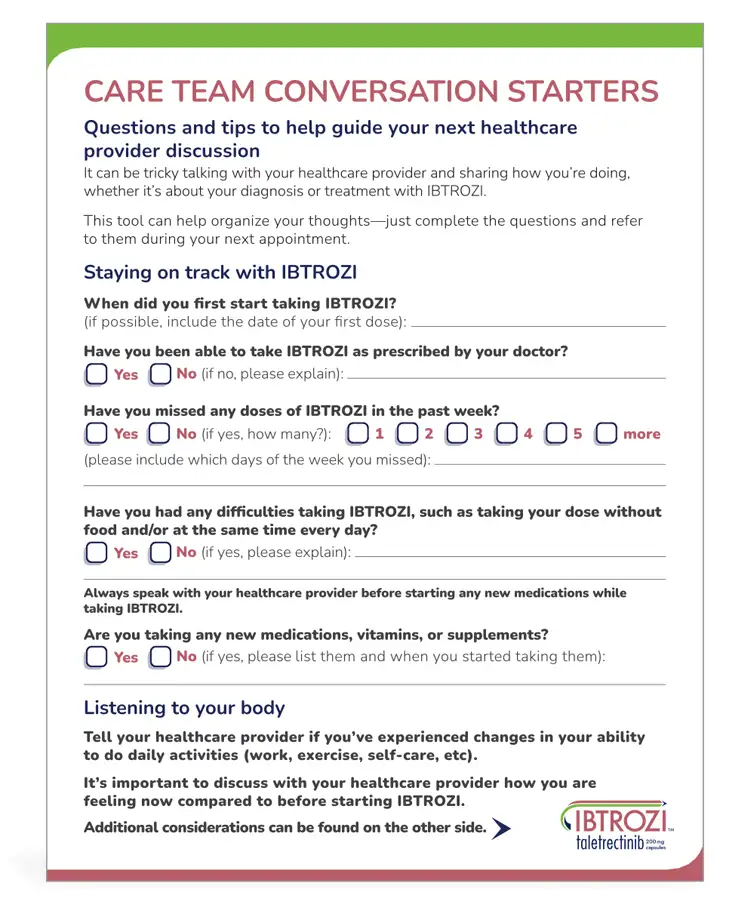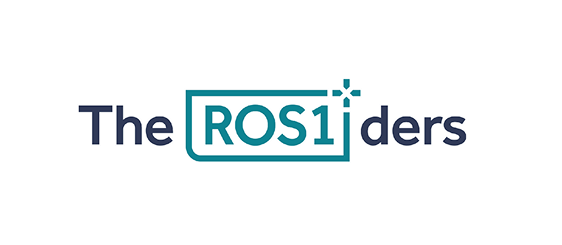

Patient Resources
Downloads
We’re here to guide and support your treatment journey with IBTROZI. Here are some useful resources you can download and refer to whenever you need.

IBTROZI Brochure
Download this brochure if you or someone you love has been diagnosed with ROS1+ NSCLC and is ready to start treatment with IBTROZI.

Discussion Guide
Download this conversational assessment tool to prepare for office visits and check-ups.
Patient Information for IBTROZI
FAQs
Helpful answers to keep you moving forward with IBTROZI
NSCLC is the most common type of lung cancer. About 80% to 85% of lung cancer cases are NSCLC. Lung cancer happens when cells in the lungs change (or are abnormal) and grow out of control, forming a lump, called a tumor, in the lungs.
Biomarker test results can help your healthcare provider find what may be causing your cancer to grow and which treatment choices may be most appropriate for you.
ROS1+ NSCLC is a type of lung cancer where the ROS1 gene is altered (or are abnormal). A ROS1 alteration can happen to anyone. This alteration occurs in a small number of people with lung cancer and often affects people who haven't smoked or smoked very little. About 2% of people with NSCLC have cancer that tests positive for ROS1 mutations. People diagnosed with ROS1+ NSCLC also tend to be younger compared to the typical age of those with other types of NSCLC.
There are targeted therapies called tyrosine kinase inhibitors (TKIs) designed specifically to target ROS1.
Your biomarker test results showed that your tumor is ROS1+, which is why you are eligible for this targeted treatment.
IBTROZI is a nonchemotherapy, targeted oral therapy designed specifically to treat adults with NSCLC that has spread within the chest, or to other parts of the body, and is caused by an abnormal ROS1 gene. IBTROZI is specifically designed to treat your type of cancer.
Before you were prescribed IBTROZI, your healthcare provider likely performed baseline health assessments. Your healthcare provider will continue to monitor you while you're taking IBTROZI. Tell your healthcare provider about all of the prescription and over-the-counter medications, vitamins, or herbal supplements you take.
Remember to take IBTROZI exactly as your healthcare provider tells you to take it. Don't change your dose or stop taking IBTROZI unless your healthcare provider tells you to. If you experience side effects, speak to your healthcare provider.
Before taking IBTROZI tell your healthcare provider about all your medical conditions, including if you:
- have liver problems.
- have lung or breathing problems other than lung cancer.
- have any heart problems, including a condition called long QT syndrome.
- have gout.
- are pregnant or plan to become pregnant.
- are breastfeeding or plan to breastfeed. It is not known if IBTROZI passes into your breast milk. Do not breastfeed during treatment and for 3 weeks after the last dose of IBTROZI.
IBTROZI comes in 200 mg capsules, and the recommended dose is 600 mg (3 capsules). IBTROZI has simple, once-daily dosing:
- Take 3 IBTROZI pills once a day
- Take on an empty stomach (2 hours before or 2 hours after eating)
- Take IBTROZI at about the same time each day
- Take with water (swallow pills whole)
Do not open, crush, chew, or dissolve the capsule before swallowing.
Store IBTROZI at room temperature between 68°F to 77°F (20°C to 25°C).
Keep IBTROZI and all medicines out of the reach of children.
If you miss a dose of IBTROZI, do not take an extra dose. Just skip the dose and take your next dose at the regularly scheduled time the next day.
If you vomit at any time after taking a dose of IBTROZI, do not take an extra dose. Just take your next dose at the regularly scheduled time the next day.
Yes, some medications interact with IBTROZI. IBTROZI may affect the way other medicines work, and other medicines may affect how IBTROZI works. You should never start a new medication without speaking to your healthcare provider.
- Avoid taking proton pump inhibitor (PPI) or H2 blocker medicine. If you take an antacid, take it at least 2 hours before or 2 hours after taking IBTROZI.
You should limit time in the sun during treatment with IBTROZI. IBTROZI may make your skin sensitive to sunlight. Wear a hat and clothes that cover your skin and use sunscreen with sun protective factor (SPF) if you are in the sun during treatment with IBTROZI and for at least 5 days after your last dose of IBTROZI.
You should avoid grapefruit, grapefruit juice, or products that contain grapefruit during your treatment with IBTROZI. Grapefruit may increase the amount of IBTROZI in your blood, which may increase the risk of IBTROZI side effects.
The most common side effects related to IBTROZI include:
- diarrhea
- constipation
- dizziness
- vomiting
- nausea
- tiredness
- rash
- changes in your liver function tests
- decreased white blood cell levels
Some serious side effects of IBTROZI include:
- liver problems
- lung problems
- changes in the electrical activity of your heart called QT prolongation
- increased uric acid level in your blood (hyperuricemia)
- muscle pain, tenderness, and weakness (myalgia)
- bone fractures
To see all possible side effects of IBTROZI, please visit IBTROZI.com/safety
If side effects occur, talk to your healthcare provider right away. Side effects that involve liver problems, lung problems, and changes in the electrical activity of your heart require immediate attention. Your healthcare provider can decrease your dose, temporarily stop, or completely stop your treatment with IBTROZI if you have certain side effects.
IBTROZI is available by prescription only. IBTROZI is available through certain specialty pharmacies who can deliver the medication to you by mail. Make sure you discuss your options with your healthcare provider.
NuvationConnect™ offers a suite of patient support programs to potentially remove financial barriers and ensure access to IBTROZI. The NuvationConnect team can help you understand coverage, cost, and care.
Learn more at NuvationConnect.comCommunity support
The cancer journey can sometimes feel isolating, but you aren’t alone. Joining a community of people who understand what you’re going through can help you feel supported, share experiences, and find strength together.
Tips for connecting

Start small
If you're not ready to share your story, it's okay to start by listening
Share your experience
Your journey can help others who feel alone
Ask questions
Reach out and ask others to share their experiences for valuable insights
Be open
Support can come from patients like you, as well as caregivers, nurses, doctors, and community leaders
Join the conversation
These are just a few of the many communities that provide support for people diagnosed with NSCLC:

Join the ROS1ders community
The ROS1ders is a global group of patients and caregivers of patients with ROS1+ cancer. Their goal is to improve outcomes for all ROS1+ cancers through community, education, and research.

Join the GO2 for Lung Cancer community
GO2 for Lung Cancer provides free, personalized, easy-to understand information about NSCLC, diagnostic testing, and types of treatments, as well as services to help you advocate for yourself as you navigate your cancer journey.

Join the LUNGevity community
LUNGevity provides information and resources in their Rare Mutations and Fusions Gateway, which includes ROS1, to help patients be more active participants in their healthcare decisions, as well as receive support and connection.
The support groups listed above are independent and not affiliated with Nuvation Bio.
Any information they provide is general in nature and not a substitute for professional medical advice.
You’re part of a community of people who can share inspiration and support for one another
NSCLC=non-small cell lung cancer; ROS1+=ROS proto-oncogene 1–positive.
What is IBTROZI?
IBTROZI™ (taletrectinib) is a prescription medicine used to treat adults with non-small cell lung cancer (NSCLC) that has spread within your chest or to other parts of the body and is caused by an abnormal ROS1 gene.
It is not known if IBTROZI is safe and effective in children.
IMPORTANT SAFETY INFORMATION
What is the most important information I should know about IBTROZI?
IBTROZI can cause serious side effects, including:
- Liver problems (Hepatotoxicity). Changes in liver function can happen during treatment with IBTROZI and can lead to liver injury and death. Your healthcare provider will do blood tests to check your liver function before starting, every 2 weeks during the first 2 months of treatment, then monthly as needed during your treatment with IBTROZI. Tell your healthcare provider right away if you develop signs and symptoms of liver problems, including:
- yellowing of your skin or the white part of your eyes (jaundice)
- dark or "tea-colored" urine
- light-colored stools (bowel movements)
- loss of appetite
- nausea or vomiting
- pain on the upper right side of your stomach
- feeling tired or weak
- Lung problems (Interstitial Lung Disease/Pneumonitis). IBTROZI can cause lung problems that are severe, life-threatening, or lead to death. Tell your healthcare provider right away if you have any new or worsening symptoms of lung problems, including trouble breathing, shortness of breath, cough (with or without mucus), or fever.
- Changes in the electrical activity of your heart (QT prolongation). QT prolongation can cause irregular heartbeats that can be life-threatening. Your healthcare provider will do tests before and during your treatment with IBTROZI to check the electrical activity of your heart and your body salts (electrolytes). Tell your healthcare provider right away if you feel faint, lightheaded, dizzy, or feel your heart beating irregularly or fast during your treatment with IBTROZI. These may be symptoms related to QT prolongation.
- Increased uric acid level in your blood (Hyperuricemia). Your healthcare provider will check your uric acid blood level before and during your treatment with IBTROZI. Your healthcare provider may prescribe medicines to lower uric acid if needed. Tell your healthcare provider if you develop any of the following symptoms of hyperuricemia:
- red, hot, tender, or swollen joints, especially in your big toe
- pain in your stomach-area
- nausea or vomiting
- pink or brown urine
- Muscle pain, tenderness, and weakness (Myalgia). IBTROZI can cause myalgia with or without an increase in the level of an enzyme in your blood called creatine phosphokinase (CPK), which may be a sign of muscle damage. Your healthcare provider will do blood tests to check your CPK blood levels every 2 weeks during the first month and as needed if you experience unexplained muscle pain, tenderness, or weakness with IBTROZI. Tell your healthcare provider if you develop any of these symptoms.
- Bone fractures. IBTROZI can increase your risk of bone fractures, which may happen with or without a fall or other injury. Tell your healthcare provider if you develop pain, changes in movement, or bone abnormalities.
- Harm to your unborn baby. IBTROZI should not be used in pregnancy. Tell your healthcare provider right away if you become pregnant or think you may be pregnant during treatment with IBTROZI.
- If you are a female who is able to become pregnant, your healthcare provider should do a pregnancy test before starting IBTROZI. Use an effective birth control (contraception) during treatment and for 3 weeks after the last dose of IBTROZI.
- If you are a male with a female partner who is able to become pregnant, use an effective form of contraception during treatment and for 3 weeks after the last dose of IBTROZI.
What are the most common side effects of IBTROZI?
- The most common side effects of IBTROZI include: diarrhea, nausea, vomiting, dizziness, rash, constipation, tiredness, changes in your liver function tests, and decreased white blood cell levels.
These are not all the possible side effects of IBTROZI. Call your healthcare provider for more information or medical advice about side effects. You may report side effects to FDA at 1-800-FDA-1088 or www.fda.gov/medwatch.
What should I tell my healthcare provider before starting IBTROZI?
Before taking IBTROZI tell your healthcare provider about all your medical conditions, including if you:
- have liver problems.
- have lung or breathing problems other than lung cancer.
- have any heart problems, including a condition called long QT syndrome.
- have gout.
- are pregnant or plan to become pregnant.
- are breastfeeding or plan to breastfeed. It is not known if IBTROZI passes into your breast milk. Do not breastfeed during treatment and for 3 weeks after the last dose of IBTROZI.
Tell your healthcare provider about all medicines you take, including prescription and over-the-counter medicines, vitamins, or herbal supplements.
Will medications interact with IBTROZI?
IBTROZI may affect the way other medicines work, and other medicines may affect how IBTROZI works.
- You should not start or stop any medicine before you talk with your healthcare provider who prescribed IBTROZI.
What should I avoid while taking IBTROZI?
- Avoid taking proton pump inhibitor (PPI) or H2 blocker medicine. If you take an antacid, take it at least 2 hours before or 2 hours after taking IBTROZI.
- You should limit time in the sun during treatment with IBTROZI. IBTROZI may make your skin sensitive to sunlight. Wear a hat and clothes that cover your skin and use sunscreen with sun protective factor (SPF) if you are in the sun during treatment with IBTROZI and for at least 5 days after your last dose of IBTROZI.
- You should avoid grapefruit, grapefruit juice, or products that contain grapefruit during your treatment with IBTROZI. Grapefruit may increase the amount of IBTROZI in your blood, which may increase the risk of IBTROZI side effects.
Please read the accompanying Patient Information.
